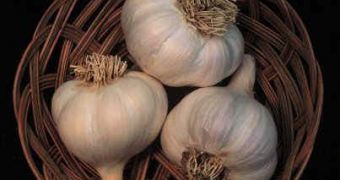If you don't like garlic sprinkled on your food, for an extra-spiced flavor, you might successfully take it to cure different diseases or to treat malfunctions of the body. Modern science has reached the same conclusion as our ancestors did, who held this particular kind of herbal remedy in great esteem. Consequently, garlic is now “officially” a natural antibacterial, antifungal and antiviral remedy.
Thus, it has been proven that garlic is effective in fighting against atherosclerosis and certain types of cancer, it diminishes cholesterol and decreases blood pressure, strengthens the immune system, fights against flu viruses and those inducing cold sores, to name just some of its many benefits. It's a natural remedy that might help you get through winter more easily, preventing colds, coughing, and other similar affections better than any pill would.
Since World War I and II, when used as an antiseptic to prevent gangrene, garlic has come to fully reveal its antibacterial features: it is now being used to treat middle ear infections, and other types of bacteria caused conditions (despite its strong odor, it actually works in decreasing the bacteria in the mouth). It is powerful enough to annihilate the nitrates compounds contained in food, which are responsible for producing cancers – its ingestion stimulates the cells in the immune system to fight against cervical, breast, stomach, and skin cancer.
Garlic is also efficient in dilating the walls of the vessels, causing a lower blood pressure and reducing the possibility of a heart attack. People with high sugar levels should also use it to decrease sugar and triglyceride levels.
There are many who say that garlic is a great remedy for acne problems as well, which is why mixtures containing this raw ingredient are being used to cure such affections. These mixtures are gently rubbed on the face several times a day, for a long period. The method is not fully approved by specialists, who consider it yet too rough for a sensitive skin.

 14 DAY TRIAL //
14 DAY TRIAL //